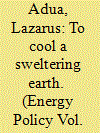| Srl | Item |
| 1 |
ID:
183579


|
|
|
|
|
| Summary/Abstract |
This study examines income- and wealth-based disproportionalities in carbon emissions from energy consumption in the residential sector of the United States. An ongoing debate in the field is whether or not inequality drives environmental degradation, especially carbon emissions. This study speaks to this important debate, focusing on the micro (household) level. While numerous studies address this question, they have done so largely at the macro- (cross-national) or meso- (subnational states and provinces) level. Based on probability-weighted ordinary least squares regression analysis of nationally representative data pertaining to United States households, I find substantial positive relationship between income and wealth inequality and carbon emissions from residential energy consumption. The data show huge disproportionalities in carbon emissions from energy consumption among the households analyzed, suggesting inequality does not bode well for environmental protection. What this finding also implies is that measures implemented to reduce income- and wealth-based inequalities may double as climate change mitigation policies.
|
|
|
|
|
|
|
|
|
|
|
|
|
|
|
|
| 2 |
ID:
098613


|
|
|
|
|
| Publication |
2010.
|
| Summary/Abstract |
As technical efficiency improvement in energy use remains a touchstone measure to curb greenhouse gas (GHG) emissions, there is substantial concern about whether this approach can offset the large and expanding impacts of human actions. Critics contend that without adjustments to the prevailing consumptive lifestyle, energy efficiency improvement will generate only token reductions in GHG emissions. I address this concern by examining the extent to which technical efficiency improvement in energy use offsets the impacts of housing-related lifestyle on GHG emissions. I build from two perspectives, the physical-technical-economic models that consider energy efficiency improvement as a potent strategy to curb residential energy consumption, and the lifestyle and social-behavioral approach, which questions this view. The analyses reveal consistent positive relationship between lifestyle and energy consumption. The results also indicate that energy efficiency improvement has mixed effects on energy consumption. In fact, model-based figures show that technical efficiency improvement in energy use leads to slightly higher energy consumption if it is not accompanied by adjustments to lifestyle.
|
|
|
|
|
|
|
|
|
|
|
|
|
|
|
|